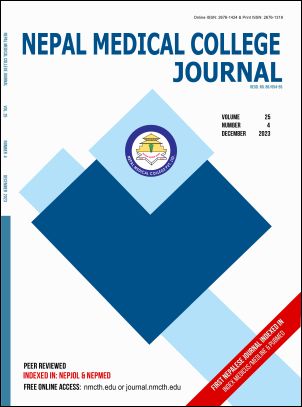Prevalence of fungal infection in clinically suspected cases of pulmonary tuberculosis visiting a tertiary care hospital
DOI:
https://doi.org/10.3126/nmcj.v25i4.60871Keywords:
Candida, tuberculosis, GeneXpertAbstract
Pulmonary tuberculosis is the most important health concerns. Some fungi may acquire pathogenic potential in immunocompromised persons due to underlying diseases, use of prolonged antibiotics, chronic disease and malignancy. The presence of fungal pathogens in cases of pulmonary TB adds to the chronicity of the disease and being difficult to treat. This study aimed to evaluate tuberculosis (TB) status and coinfection of TB with pulmonary fungal infections. A total of 330 sputum samples were collected from suspected pulmonary TB and were examined using Ziehl-Neelsen (Z-N) staining method as per revised national tuberculosis control program (RNTCP) guidelines and GeneXpert assay procedure adopted, was in accordance with the WHO recommended guidelines. Those sputum samples were also processed for fungal culture. In case of any growth, this was identified by gram staining or by lactophenol cotton blue wet mount preparation and slide culture technique, if needed. A total of 29 (8.8%) samples out of 330 yielded tuberculosis by GeneXpert assay. Maximum positivity was noted among age group 31- 45 years (15.5%). In the present study, GeneXpert positivity for the Mycobacterium tuberculoris (MTB) detected rate remained to be 8.8% (29/330) detected as against smear positivity in only 5.4% (18/330) (P value: 0.001). Out of 18, Z-N smear positive samples, maximum i.e. 17, which had yielded either high or medium detected of TB bacilli in the GeneXpert assay. Whereas, out the rest 12 GeneXpert positive (low and very low) samples, only one sample showed acid fast bacilli in the smear. A significant correlation was found between GeneXpert and smear positivity (p<0.001). Overall, 90 (27.7%) Candida spp. were isolated. Interestingly, 7 of these 90 Candida positive samples were found to positive to MTB by GeneXpert test, accounting a prevalence rate of 24.1% (7/29) of Candida coinfection among TB cases. Tuberculosis remains a global threat despite effort to eradicate the disease and TB co-infection with Candida spp. may complicate infection and treatment. In this present study, although the prevalence rates of all the coinfections were low and statistically not significant. Being chronic in nature and with confusing clinical and radiological findings, these fungal infections are misdiagnosed as reactivation of tuberculosis. Screening for TB should be conducted to diagnose early and treat these opportunistic infections and decrease mortality and morbidity rates associated with fungal coinfection in tuberculosis patients.
Downloads
Downloads
Published
How to Cite
Issue
Section
License
Copyright (c) 2023 Nepal Medical College Journal

This work is licensed under a Creative Commons Attribution 4.0 International License.
This license enables reusers to distribute, remix, adapt, and build upon the material in any medium or format, so long as attribution is given to the creator. The license allows for commercial use.




